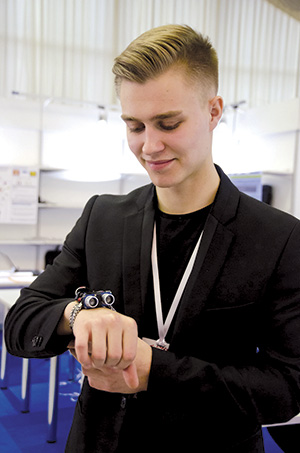
Anton Lyubokhinets develops device to help the blind
|
Key elements of the inventor’s system are a quadcopter and a bracelet with a GPS module, which every beach holidaymaker receives. In an emergency situation, the person can press a button, sending a message to the computer at a rescue point. It takes just a few seconds for the machine to process the information and detect the drowning person’s location. It then transmits a signal to a pilotless quadcopter, which flies to the site and throws an inflatable pillow and vest. “My invention is aimed at sea coasts, as it’s much more difficult to locate someone in the sea,” Anton adds.
A prototype (costing around $1,000-$750 for the quadcopter, $50 for the saving devices and $200 for the GPS transmitter) has been tested several times. “Quadcopters are already used to deliver mail, pizza and other small items, but I’ve decided to use them for rescue purposes, which are much more important than mail and, especially, pizza,” Anton emphasises.
At the gymnasium, the first year student’s favourite subjects are informatics, mathematics and physics. He’s also studying ‘Automation of Technological Processes and Production’ at Brest Technical University and admits that his interests are influenced by watching the Discovery and National Geographic channels on television.
Watching a Discovery programme one day, Anton saw ‘superpeople’, with unusual capabilities, and was especially impressed by a visually impaired person who made tut-tutting noises to determine where obstacles lay, picking up reflected sound. Anton felt inspired to create a device to help those with poor vision find their way. His ‘Echo Glove’ bracelet uses the principles of echolocation, sending an ultrasound, which is reflected back as light vibration, showing the proximity of an obstacle. Meanwhile, the strength of vibration alters with relative distance.
“My device can be further perfected and integrated into more complicated devices I have planned. I hope my ‘Echo Glove’ will come into production, providing an aid to people with poor vision. Of course, the project needs investment,” adds Anton, who is preparing to show his latest innovation at Moscow’s Startup Weekend: publicly placed solar-powered sites to charge phones and tablets. “The idea is simple but is obviously useful. I propose that we install benches in public places, where people can plug in their phones and other devices to recharge, drawing power from solar powered batteries. We can fit several USB-ports and anti-vandal wires, even offering free Wi-Fi,” he comments.
Anton hopes his project at Moscow’s Startup Weekend will enjoy as much success as his entry in the 100 Ideas for Belarus contest. In 2014, he participated in the Fair of Ideas, organised by Google for under-18s, and was among the top twelve in the regional round. Sadly, he failed to reach the finals but Anton knew that perseverance is all, and was not deterred.
By Pavel Losich











